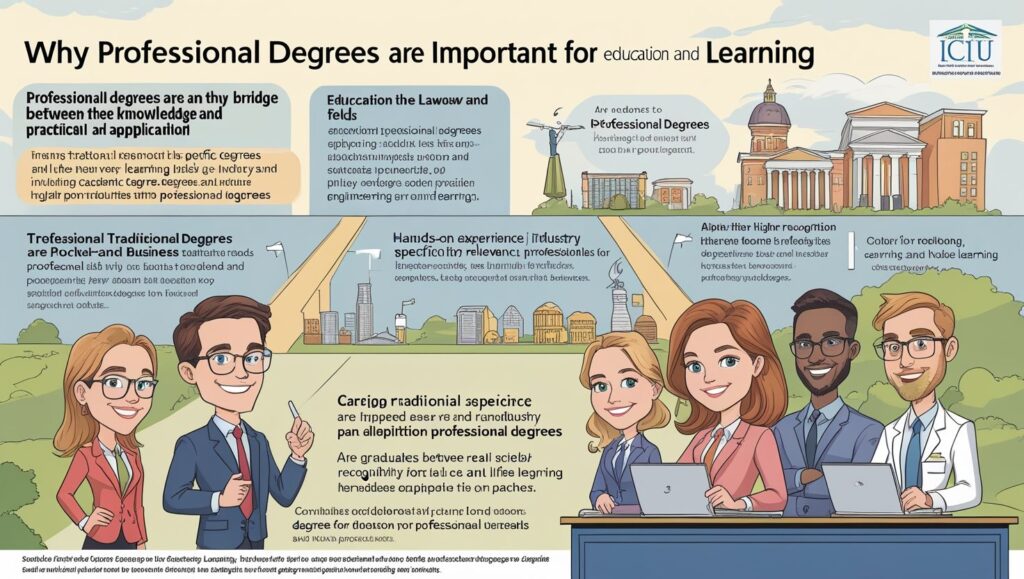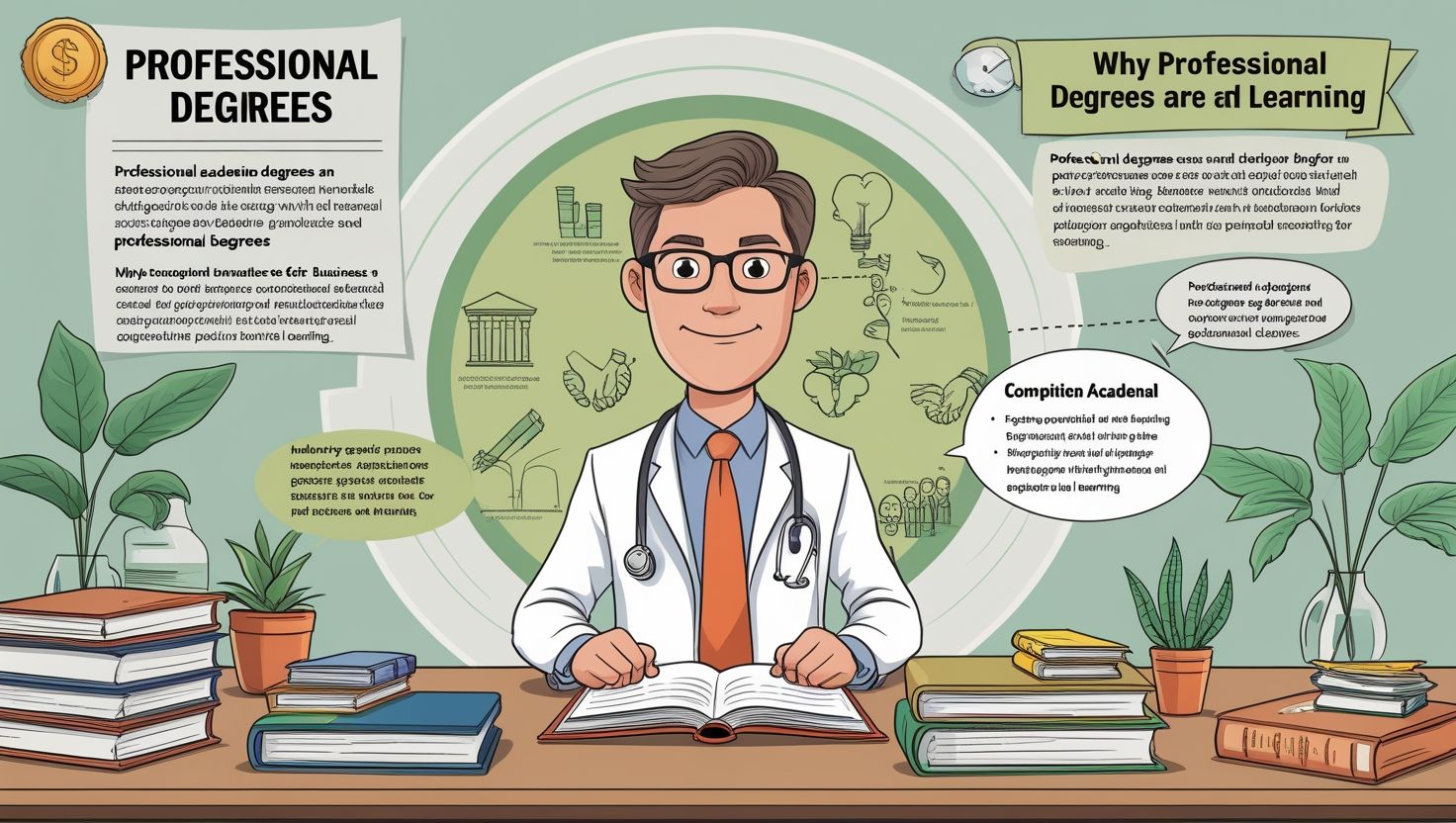Why Professional Degrees Are Important for Education and Learning, In today’s rapidly evolving world, education and learning have become the cornerstones of personal and professional success. Among the various forms of education, professional degrees hold a unique and significant place. A professional degree a specialized program designed to prepare individuals for specific careers, such as medicine, law, engineering, business, or architecture. These degrees are often contrasted with academic degrees, which focus more on theoretical knowledge and research. This article explores the importance of professional degrees in education and learning, comparing them to traditional academic degrees and highlighting their unique advantages.
1. Career-Oriented Learning
One of the most significant advantages of professional degrees is their focus on career-oriented learning. Unlike academic degrees, which often emphasize theoretical knowledge and research, professional degrees are designed to equip students with practical skills and expertise directly applicable to their chosen field. For example, a medical degree (MD) prepares students to diagnose and treat patients, while a law degree (JD) trains them to practice law. This practical focus ensures that graduates are job-ready and can immediately contribute to their profession.
In contrast, academic degrees, such as a Master of Arts (MA) or a Doctor of Philosophy (PhD), often require additional training or certifications to enter specific professions. While academic degrees provide a strong foundation in critical thinking and research, they may not always translate directly into employable skills. Professional degrees bridge this gap by aligning education with industry needs, making them highly valuable in today’s competitive job market.
2. Meeting Industry Demands
Professional degrees tailored to meet the demands of specific industries. As industries evolve, so do the curricula of professional degree programs. For instance, engineering degrees now include courses on artificial intelligence and renewable energy, reflecting the growing importance of these fields. Similarly, business degrees often incorporate modules on digital marketing and data analytics, which are essential in the modern business landscape.
This adaptability ensures that graduates of professional degree programs are well-prepared to tackle contemporary challenges and contribute to innovation in their fields. In contrast, academic degrees may not always keep pace with industry trends, as their focus is often on theoretical exploration rather than practical application. By aligning education with industry needs, professional degrees play a crucial role in driving economic growth and technological advancement.
3. Hands-On Experience and Skill Development
Professional degrees emphasize hands-on experience and skill development, which are critical for success in many careers. For example, medical students undergo clinical rotations, law students participate in moot courts, and engineering students complete internships or capstone projects. These experiences allow students to apply their knowledge in real-world settings, develop problem-solving skills, and build confidence in their abilities.
In contrast, academic degrees often prioritize research and theoretical analysis, which, while valuable, may not provide the same level of practical exposure. The hands-on nature of professional degrees ensures that graduates are not only knowledgeable but also capable of performing effectively in their chosen professions. This practical focus is particularly important in fields where mistakes can have significant consequences, such as healthcare or engineering.
4. Professional Networking and Mentorship
Professional degree programs often provide opportunities for networking and mentorship, which are invaluable for career development. Students in these programs interact with industry professionals, alumni, and peers, building connections that can lead to job opportunities, collaborations, and mentorship. For example, business schools often have strong alumni networks that help graduates secure positions in top companies.
In contrast, academic degree programs may not always offer the same level of networking opportunities, as their focus is often on individual research and scholarship. The relationships formed during professional degree programs can have a lasting impact on a graduate’s career, providing guidance, support, and access to resources that might otherwise be unavailable.

5. Higher Earning Potential and Job Security
Graduates of professional degree programs often enjoy higher earning potential and greater job security compared to those with academic degrees. This is because professional degrees are directly tied to specific, high-demand careers. For example, doctors, lawyers, and engineers typically earn higher salaries than individuals with general academic degrees. Additionally, the specialized skills acquired through professional degrees make graduates less susceptible to job market fluctuations.
While academic degrees can also lead to lucrative careers, they often require additional qualifications or experience to reach the same level of earning potential. Professional degrees provide a clear pathway to well-paying, stable careers, making them an attractive option for many students.
6. Contribution to Society
Professional degrees not only benefit individuals but also contribute to society as a whole. Graduates of these programs often work in fields that address critical societal needs, such as healthcare, law, education, and infrastructure development. For example, doctors save lives, lawyers uphold justice, and engineers build the infrastructure that supports modern life. By preparing individuals for these essential roles, professional degrees play a vital role in advancing societal well-being.
In contrast, while academic degrees also contribute to society through research and scholarship, their impact may be less direct. Professional degrees ensure that there is a steady supply of qualified professionals to meet societal needs, making them indispensable to the functioning of modern society.
7. Global Recognition and Mobility
Professional degrees often globally recognized, providing graduates with opportunities to work and practice in different countries. For example, a medical degree from a reputable institution is recognized worldwide, allowing doctors to practice medicine in various countries after meeting local licensing requirements. Similarly, engineering and business degrees from accredited institutions valued globally, opening doors to international career opportunities.
In contrast, academic degrees may not always have the same level of global recognition, particularly if they are highly specialized or tied to a specific region. The global mobility offered by professional degrees a significant advantage in today’s interconnected world, where professionals often seek opportunities beyond their home countries.
8. Lifelong Learning and Adaptability
Professional degrees instill a mindset of lifelong learning and adaptability, which are essential in today’s fast-changing world. Many professional fields require continuous education and skill development to stay current with advancements. For example, doctors must keep up with medical breakthroughs, and IT professionals must stay updated on the latest technologies. Professional degree programs often emphasize the importance of ongoing learning, preparing graduates to adapt to changes in their fields throughout their careers.
While academic degrees also promote critical thinking and research skills, they may not always emphasize the need for continuous professional development. The focus on lifelong learning in professional degrees ensures that graduates remain relevant and competitive in their careers.
Conclusion
In conclusion, professional degrees play a crucial role in education and learning by providing career-oriented, practical, and industry-aligned education. They offer numerous advantages, including hands-on experience, professional networking, higher earning potential, and global recognition. While academic degrees valuable for their focus on theoretical knowledge and research, professional degrees bridge the gap between education and employment, ensuring that graduates are well-prepared to meet the demands of their chosen professions.
In a world where the job market is increasingly competitive and industries are constantly evolving, professional degrees offer a clear pathway to success. They not only benefit individuals but also contribute to societal progress by preparing professionals to address critical needs. As such, professional degrees are an essential component of modern education and learning, providing the skills, knowledge, and opportunities necessary for personal and professional growth.

8 thoughts on “Why Professional Degrees Are Important for Education and Learning”
Comments are closed.